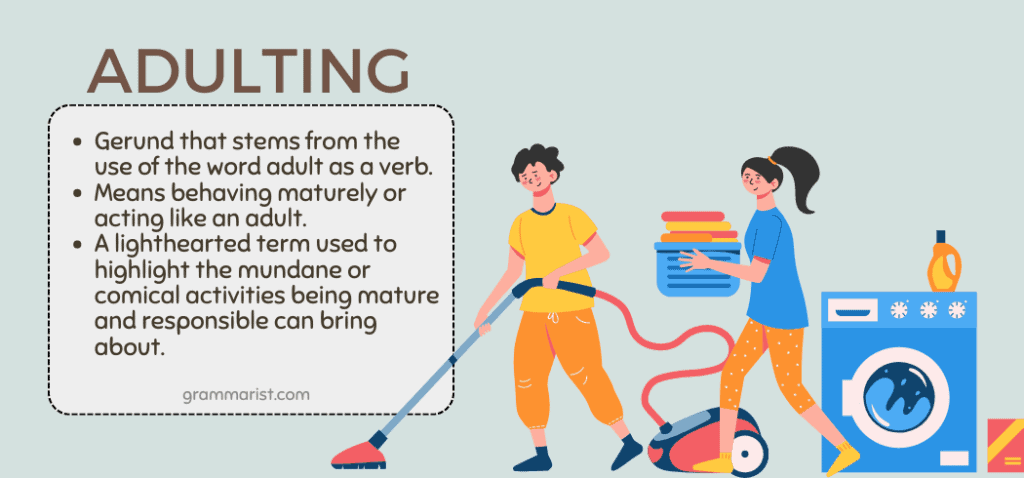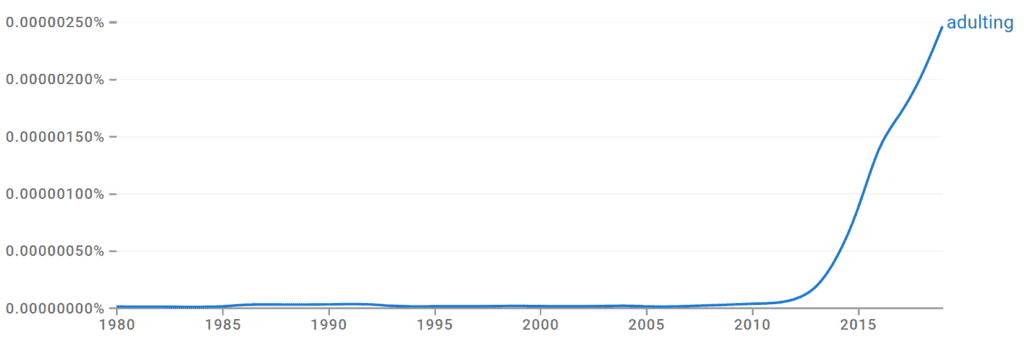Using a noun as a verb is a popular way to make a clear point about actions or behaviors. In fact, this practice has a grammatical name: gerund.
Gerunds are often adapted via pop culture, jokes and memes, and social interactions that are unique or witty. They also are fairly descriptive and true to their original meaning, making them easy to use and understand even by English language learners.
When somebody tells you they are adulting, they are making it clear they are partaking in adult behaviors, usually in reference to responsibilities one takes on as an adult. Let’s see where this term originated from and how you can use it in a sentence.
What Is the Meaning of Adulting?

Adulting is a fairly new gerund that stems from the use of the word adult as a verb. A gerund is a verb form ending in -ing that acts as a noun. Adulting simply means behaving maturely or acting like an adult.
For example:
- After staying up late taking care of a sick child, I seriously don’t feel like adulting today and just want to sleep.
- Older generations always reference the lack of adulting behaviors they see in the generations that follow them.
Currently, the term continues to be an online phenomenon that highlights basic adult tasks such as making dinner or washing laundry and folding them on the same day – as if these mundane tasks were a successful challenge. These types of shares often bring about criticism of the authors, with many viewing the need to post or comment about every engagement in adult behavior as immature.
For example:
- I made myself breakfast even though I didn’t get in from the party until 4 am. #adulting
- Look at me adulting enough to make it to class on time.
However, the concept of adulting has also taken on a humorous connotation amongst social media platforms, with older generations making fun of their adult behaviors while they struggle to make a go of things.
For example:
- Spent the day running kids to various activities and keeping them fed. Ate a bag of fries for lunch and a cookie for dinner. #adulting
- Who knew adulting would include cleaning up both dog and child puke on the same day?
When Did the Term Adulting Appear?

The use of the word adult as a verb is a fairly recent phenomenon. According to the Merrium-Webster dictionary, adulting was a jocular form of the word adultery.
It truly didn’t begin to enter mainstream English usage until the rise of social media platforms around 2008. Even then, it wasn’t popular until the publication of Adulting: How to Become a Grown-Up in 468 Easy(ish) Steps by Kelly Williams Brown in 2013.
It was added to the Urban Dictionary in 2014 and has risen in popularity due to hashtags and memes across various social media publications.
It is an informal term almost exclusively online but occasionally makes its way into speech between friends and family.
Let’s Review
Adulting is a gerund or a verb created from a familiar noun. It is a lighthearted term used to highlight the mundane or comical activities being mature and responsible can bring about.
Made popular via social media, it is used in informal speech and writing and is more popular amongst younger generations to highlight their day-to-day tasks.
